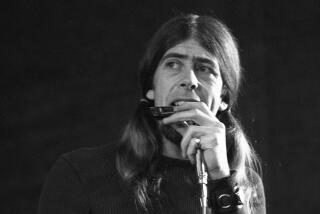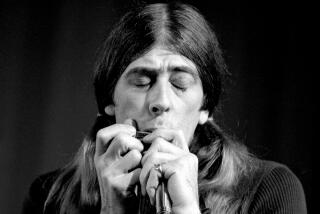MUSIC REVIEW : Blues Legend Mayall Delivers With Passion
- Share via
SAN DIEGO — They call John Mayall the “Godfather of British Blues,” and,chronologically and geographically speaking, he rightly could lay claim to the sobriquet.
But to get a true perspective on the man’s place in contemporary blues, consider this: When Mayall released “Blues BreakersJohn Mayall With Eric Clapton”--the 1965 album that signaled that decade’s epochal blues renaissance in England--current electric-blues hotshot Robert Cray was 12 years old and the late Stevie Ray Vaughan was 9.
Mayall, now 57, opened his show Thursday night at the Belly Up Tavern with “All Your Love,” the first track on that pivotal 1965 opus. Mayall sang and played the snaky Otis Rush-Willie Dixon tune with the flinty vigor of a man half his age, demonstrating that he has lost none of the passion he brought to his early work, which has so influenced today’s contempo-bluesers.
His own talents notwithstanding, Mayall will be remembered for shepherding a host of stellar musicians through his various projects, among them Clapton, Jack Bruce, Peter Green, Aynsley Dunbar and Mick Taylor. But it always was a mutually beneficial arrangement; Mayall has created some of his best music by rising to the challenge posed by superior players.
If the current Bluesbreakers lineup is unlikely to produce a household name on the order of the above mentioned, it isn’t for lack of talent. The current Bluesbreakers lineup features a taut trio of bassist Rich Cortez, drummer Jerry Whaley and guitarist Coco Montoya, who provided yeoman support Thursday. Montoya, in particular, caught fire several times and won the lungs and hearts of a jam-packed Belly Up in Solana Beach.
Montoya is a prize student of the post-Clapton (by way of B.B., Albert and Freddie King) blues school--the steady tension builds, the savage slashes and heart-rending bends, the voluptuous vibrato, the measured balance of discursive lyricism and frantic riffing. But he’s got a freakish technique that is at first off-putting.
Montoya is left-handed but, like lefties Dick Dale and Albert King, he simply plays a right-handed Fender Stratocaster upside down. So it can be visually disconcerting to see him reach for high notes where the low notes are supposed to be. Obviously the inversion hasn’t proven a hindrance to Montoya, who is an unheralded monster. On the slow blues, “Tears Came Rollin’ Down” (from Mayall’s 1988 “Chicago Line” album), the guitarist took several remarkable solos that elicited sustained ovations. And he exhibited his versatility with some jazzy, Wes Montgomery-like octave work on J.J. Cale’s medium-tempo “Sensitive Kind.”
To keep pace with such proficiency, all Mayall has to do, of course, is sing. He’s an above-average keyboardist, mouth-harpist, and rhythm-guitarist, and he put all of those skills to work Thursday. But Mayall’s paramount gift is a reedy, naturally plaintive voice that seems produced less by the usual mechanics of vocal cords, throat and tongue than by an accumulation of ghostly head tones.
When he applied that aged-in-oak voice to such selections as the Diddley-ish “Chicago Line,” “Somebody Acting Like a Child” (from 1969’s “Blues From Laurel Canyon” album), and an obscure John Lee Hooker shuffle called “Maudie,” Mayall became a conduit for several generations of blues emotion.
A batch of tunes from his aptly titled 1990 release, “A Sense of Place”--Mayall’s 36th album--went over well, both because they cooked in live performance and because Mayall knows how to sell unfamiliar material. His act is short on theatrics, but Mayall employs just enough “stage advocacy”--exhorting his musicians, playing to the crowd, visibly relishing his own musical tasks--to turn the engine over.
That approach worked to great advantage on the jungle-funky “Congo Square” and the strutting grinder “Black Cat Moan,” on which an almost hyperactive Mayall and a stationary Montoya shared slide-guitar duties.
The two-hour show dragged a bit toward the end, due both to a silly, over-long Montoya guitar-and-vocal showcase tune called “TV Mama,” and to a rather perfunctory reading of Mayall’s “Room to Move” from 1970. The latter featured meandering solos by each of the musicians, beginning with Mayall on synthesizer, and the energy drain was almost palpable.
Fortunately, the crowd was too revved up to allow a temporary lull to ruin a great show, and when the band came back for the obligatory encore, their spirited version of Jimmy Rogers’ immortal “Last Time” ended the evening on a high note.
John Mayall’s Bluesbreakers plays at 8 p.m. at the Coach House, 33157 Camino Capistrano, San Juan Capistrano. Tickets: $19.50. Information: (714) 496-8930.
More to Read
The biggest entertainment stories
Get our big stories about Hollywood, film, television, music, arts, culture and more right in your inbox as soon as they publish.
You may occasionally receive promotional content from the Los Angeles Times.










